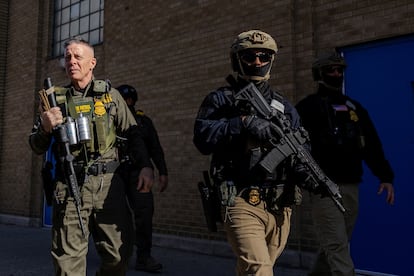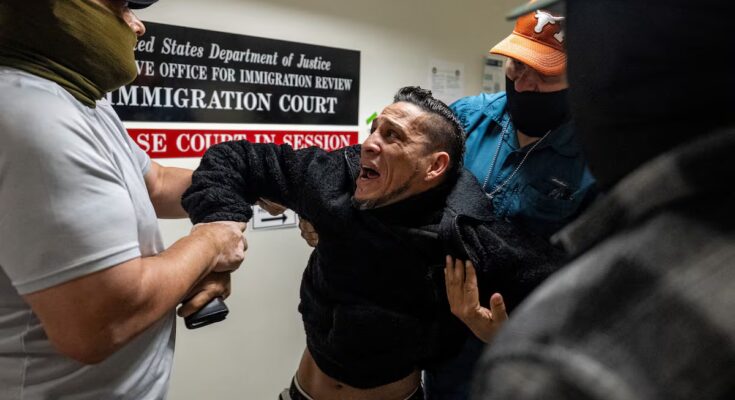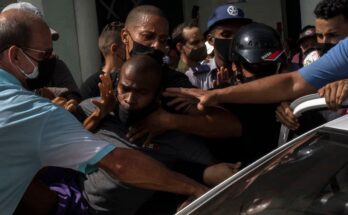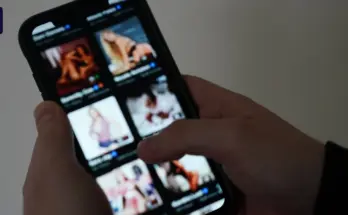Zohran Mamdani still has six weeks left to take office as the next mayor of New York City. But even before his historic Nov. 4 victory, city and state officials were preparing for the possibility that U.S. President Donald Trump would send more federal agents to bolster his immigration offensive and deploy the National Guard to the city, as he has already done in other Democratic strongholds. These preparations have intensified since the socialist politician was elected, while the Republican administration has doubled down on its threats.
“I plan to be in New York City in the near future. We will be doing operations in New York City,” border czar Tom Homan told Fox News on Tuesday. The senior official added that immigration agents are already in the city and that he intends to send more: “We will flood the area.”
It’s a warning the Trump administration has been repeating for months, but it takes on special meaning now that Mamdani will be mayor of New York City. The young democratic socialist won the mayoral race in the most populous city in the United States with a strongly anti-Trump and pro-immigration message. After a campaign in which he consistently promised to stand up to the president, as mayor-elect Mamdani remained steadfast in that pledge, openly challenging the Republican in his first post-victory speech. “New York will continue to be a city of immigrants,” he declared that night.
However, there have also been signs that Mamdani is willing to extend an olive branch, or at least try. His team announced this week that it had contacted the White House to set up a meeting with Trump. Mamdani said the hypothetical meeting would focus on the city’s economic crisis, a cornerstone of his campaign. The announcement came after the president said on Sunday that he was willing to meet Mamdani, after months of calling him a “crazy communist”.
The move comes at a time when both the city and state are preparing for a potential confrontation with the federal government if Trump decides to replicate in New York what he has already done in cities such as Los Angeles, Chicago, Portland, Oregon, Washington, D.C., and Charlotte, North Carolina. In recent months, federal agents have arrived in these cities, all governed by the Democratic Party, and carried out large-scale immigration operations that have led to hundreds of arrests. Some have also received National Guard troops, while others have managed to stop these deployments in the courts.
The presence of officers and troops was met with citizen protests that turned violent, with federal authorities responding by firing tear gas and firing rubber bullets, pepper balls and chemical weapons at protesters.
Such scenes have not been seen in New York so far. Although there have been raids, such as the one in October on Canal Street in Lower Manhattan, immigration enforcement activity has been concentrated in a single building: 26 Federal Plaza, a federal skyscraper that houses several immigration courts, also located in Manhattan. Half of the more than 3,000 migrant arrests in the city in recent months occurred there.
However, that October 21 raid served as a warning to the city. The dramatic military-style operation, with more than 50 officers and armored trucks descending on a tourist area known for its street vendors, most of them migrants, offered a glimpse of what could come in the months ahead.
Bad for the economy
Preparations to address this possibility have been led by the office of the state governor, Democrat Kathy Hochul. For weeks his team held meetings with different sectors of the company to develop a strategy. These discussions have involved business and real estate leaders, many of whom have ties to or are close to the president. The expectation is that they might intervene to prevent Trump from ordering a federal deployment to the city, signaling that such an action in New York, the country’s financial capital, would be harmful to the national economy.
“I’ve had conversations with a lot of business leaders who said, ‘When the time comes, make sure you also express your concerns about what this would do to destabilize New York City and the enormous impact this would have across America,’” Hochul said Monday. “It would have an effect that other cities don’t have because we are the financial center. And it can’t be disturbed without consequences.”
It is a strategy that has already borne fruit in San Francisco, where Trump reportedly sent troops last month but decided not to after executives of some of the big tech companies based in the Californian city objected.
Meanwhile, Hochul’s office has remained in contact with officials in cities like Chicago and Los Angeles to gather feedback on their response. Members of his team asked their counterparts in these cities how they dealt with Trump’s federalization of the National Guard, which effectively assumes control of a force that is legally under the command of each state’s governor. It is likely that New York, if necessary, will follow the lead of states like Illinois and California, which will respond with lawsuits challenging the rollouts.

New York officials also investigated how local police in several cities handled the growing presence of federal agents on the streets and how they dealt with resulting citizen protests. Like Los Angeles and Chicago, New York is a sanctuary city, meaning local law enforcement does not cooperate with federal immigration authorities. This is why the Trump administration has targeted these cities, accusing them not only of failing to cooperate with its program of mass arrests and deportations, but also of allowing crime to run rampant.
Crime was the main justification used by the government to order these deployments. However, the data shows that crime is decreasing in all the cities involved. In New York City alone, shootings and homicides hit record lows in 2025. Other serious crimes, such as burglaries and shoplifting, also declined.
Even so, the Trump administration is convinced that New York will be one of its next targets: “We are increasing the law enforcement presence in New York City – again, because it is a sanctuary city, and we know that we have a problem there with public safety threats on the streets every day,” Tom Homan said on Fox News this week. The border czar added that, like Trump, he would be willing to meet with members of Mamdani’s new government to “work together on this.” But if they don’t want to cooperate and continue to resist and impede efforts, “then we will simply send more teams there,” he concluded.
In addition to state and local officials, migrant advocacy groups, organizations and community activists are also preparing to fight the Trump administration’s plans for the city. Building on a strategy already employed in Chicago, thousands of whistles are being distributed in areas that have already been targeted by immigration agents or may be targeted due to their large immigrant populations.
New operations in the south of the country
While New York awaits its turn, the Republican administration has set its sights on the South, on cities that, although Democratic, do not have “sanctuary” policies because their respective states have laws that prohibit them. This is the case in Charlotte, North Carolina, where a migrant detention operation has been underway since last Saturday which has led to over 250 arrests. The government plans to expand the operation beyond the state’s largest city to Raleigh, where federal agents have already arrived in recent days.
The next target will be New Orleans, Louisiana. About 250 Border Patrol agents are expected to arrive in the Jazz City in the coming weeks for a two-month immigration offensive that could begin Dec. 1.
Sign up to our weekly newsletter to get more English-language news coverage from EL PAÍS USA Edition



